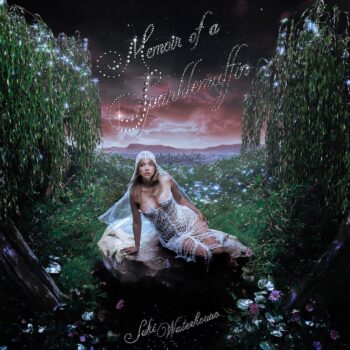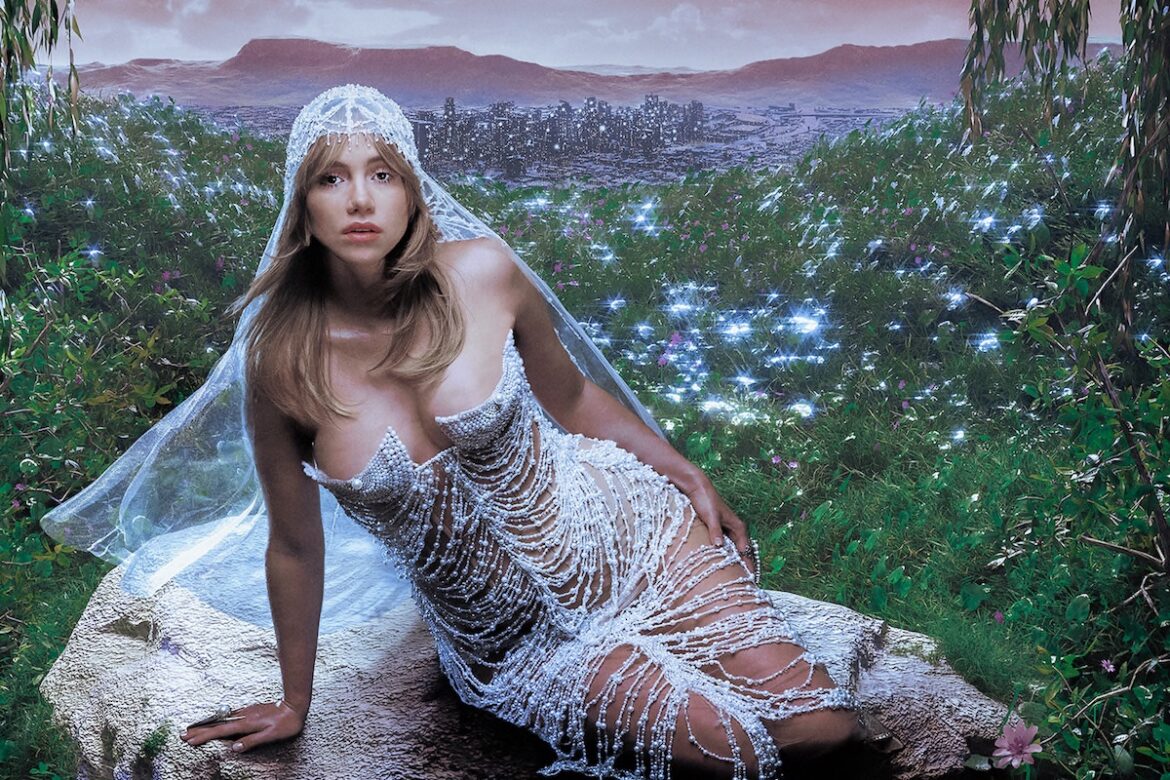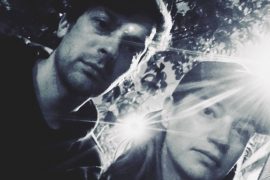Taking its place as her sophomore album, ‘Memoir of a Sparklemuffin’ continues to represent Suki Waterhouse’s keen ability to be utterly mesmerizing in her craft.
‘Memoir of a Sparklemuffin’ – Suki Waterhouse
The Sparklemuffin is an Australian jumping spider that is known for its brilliant coloring and the way it must dance to survive.
In the case of Suki Waterhouse’s second album, it also serves as a clever metaphor for the dazzling facade of a performer and a person in love.
Waterhouse is a jack of all trades. From being a mother to acting and modeling and being one of the most hypnotizing pop stars of the moment, there is no hat that Waterhouse doesn’t wear well. On the part of her musicianship – coming out of her first album I Can’t Let Go and her EP Milk Teeth, Memoir of a Sparklemuffin serves as yet another glittering display of her abilities as both a singer and a lyricist.

Opening the album is “Gateway Drug,” which is just that. The song begins with a beautiful series of guitar chords and Waterhouse’s airy entrancing vocals. The combination is addictive, and floats the listener into ecstasy upon the entrance of lyrics that sing of rediscovering love and falling into a new bout of infatuation – “let me be your gateway drug, I can show you things, get a little high off my love.”
It’s all about learning to love again, even if it’s through taking drastic measures to find the way. There’s something akin to early Oasis tracks like “Talk Tonight” and “Don’t Look Back in Anger” woven through the composition of the song and the way the lyrics and vocal delivery work with the backing instrumentation and have a subtle build and release as the track goes on.
I’ll show you places that only exist in your dreams
Take off those nightmares
and put your heart back on your sleeve
One hit and you’ll lose control
Where “Gateway Drug” is subdued and ethereal, “Supersad” ramps up the energy tenfold and serves as a call to action to take control of your emotions even in the depths of heartache. Between the fast-paced drums and Waterhouse’s persistent claims that “There’s no point in being supersad,” the song is persuasive in its mission of encouraging some playful behavior.
“I shouldn’t have said what I said last night, but I’m about to say it again,” Waterhouse sings shamelessly in the third song of the album. In a similar vein of utter joviality in the face of unfavorable situations, “Blackout Drunk” serves as a callout to tumultuous and messy relationships that get twisted and bent around. The song is filled with tones of betrayal and lighthearted revenge that is all the more emphasized by the bouncy instrumentation and angelic backing vocals. It’s all wrapped up with a sparkly bow of handclaps and some well-crafted synths and vocal distortion.
If there is one thing that Suki Waterhouse does exceedingly well in her music, it is the way in which she manages to create vivid and enticing illustrations through her words.
As one of the standout tracks of the album “Faded,” which features the inclusion of backing strings that often mimic the British singer’s vocals, leads listeners through a tale of pickup trucks and tumbles off couches.
You used to call me Yoko
‘Cause I made a joke
that all your friends are leaving
And I’m your lover
We were gonna stay together
And you could never go and date teenagers
Be the kinda man that I could read to
“Faded” is a song of young, misguided love that dances through all the colors of a failed yet once blissful relationship, and in the end it finds itself resolved in tones of simple contentment.
Switching to a more introspective perspective on how her own persona impacts her relationships, “Nonchalant” is just slightly self-deprecating in a highly relatable way to anyone who has ever felt that something about their outward demeanor must be deterring to any potential onlookers. The track can only be described as an ode to vulnerability and the idea of being perceived. Between the conflicting use of heavier guitars and more gentle strumming in the instrumentation, Waterhouse manages to display a fear of being known not only in her lyrics but in the actual song composition.
Oh, I want you so bad
Can’t find my white flag
I must’ve left it in the back of a city cab
I’m not calling you back
‘Cause then you’ll know that
‘Cause then you’ll know me
I don’t like to talk a lot
I don’t want the shoe to drop
‘Cause then you’ll know me
As the album goes on, “My Fun” jumps in as a breath of fresh air with its retro aesthetic and delivery, the song truly is fun. Between the lyrics which sing of scraped knees and cherry trees, and the instrumentation which is accented by none other than a recorder and some bluesy piano riffs – the song has a childish, youthful glow to it that is just irresistible, to say the least.
Returning to a more somber tone, “Model, Actress, Whatever” is an achingly divine dedication to falling and rising stars in the industry. With her open admissions about her experiences in the various industries she is a part of including modeling, acting, singing, motherhood, etc. there’s something so keening executed in the song that makes it a top track. It’s a cinematic and genius portrayal of the struggles and fears that are often faced and overlooked when someone is in the highlight, and in a self-aware sense, the song also gives a tribute to all the highs that are experienced in those same positions.
Careful what you ask,
love for the ages
When it’s good all on the outside,
part of the faking
You can’t write the ending,
it’s Hollywood pages
You tell them your story
and they’ll make the changes
The tune is a careful and glamorous admittance to privileges experienced and the fact that only half of a story is ever really seen. It’s a delicate and purely executed breakdown of the celebrity experience in a way that proves Waterhouse should be given credit where it is due. On her part, the song serves as acceptance of how she and her story may be perceived by outsiders. Between the switch up in lines, from “Call me a lover, disaster, whatever” to “Call me a model, an actress, whatever; call me a model, an actress, forever,” the lines spell out a personalized tale of self-acceptance in a society that has trained itself to deny such things to people who it perceives are in a position of being stuck to labels and of having no faults or fears.
Coming in midway in the tracklisting is “To Get You.” This is a song of simple composition and, well, it’s perfection. There is nothing flashy about the lyrics or the instrumentation, instead, it does what it needs to and is one of the most delightful little love songs on the project. The tune sings of the trek to gain love from another, “I had to give just about everything to get you,” Waterhouse sings with devotion oozing through her velvet voice.
Dreamy and bittersweet with angelicly haunting vocals, “Lullaby” strikes a soothing chord of ethereal longing for something that seems destined not to be despite the intense desire for it. Whilst Waterhouse sings, “I’ve got a funny feeling that I’ve felt this fear before,” a foreboding sense of both dread and ease about the situation at hand washes over and comforts the listener.
You, with your blue еyes
Here in my room
You know I hatе goodbyes
I’m leaving soon

The anthemic ballad of the album, “Big Love” comes in with a steady bang ninth in the track listing. The song speaks on a vulnerable level of admitting to the want of a “Big Love” – a love that is all consuming and often, oh, so elusive from our grasp. A key focal point of the song is Waterhouse’s introspective outlook on how she and others in similar situations attempt to fill the void left behind in the wake of wanting.
Sleeping around isn’t stopping the bleeding
The tourniquet snapped
when you said you were leaving
Thought I would die, but my body resisted
Stared at the sun til I found it
Big, big love
Big love, big love
Big love, big love
It’s all I want
Big, big love
Amidst the fallout of a relationship, what better way to cope and poke a bit of fun at the goings-on than with a little tongue-in-cheek remark, “Good luck with that lawsuit, baby” in a song called “Lawsuit.” Of note, auditorally, this song explores a more jazz-influenced instrumentation that creates an inviting and cheeky wish of karma upon whoever the song is about.
“OMG” is a whirlwind of expert execution of all its components. The song moves fluidly and intimately as Waterhouse seems to explore how she will only ever be perceived as a past version of herself to someone, rather than as who she is now. And despite meager attempts at wanting what once was, nothing will ever be the same. However, the conflicting lyrics, “You know I’m inside and I’m in between / What you want, I can’t compete” and “Take me back the way that I was / The way that I was” seem to suggest that a battle persists between wanting to go back to being a past self that exists forever in someone else’s mind, and wanting to be the person that exists in the present who is unknown to that same person.
With a slight country edge to it, “Think Twice” shines on all fronts in an unassuming way that grows on you. For one, the backing harmonies are gorgeous and pair wonderfully with the kick of the drums and acoustic guitar that lead the song and generate a stunning atmospheric landscape for Waterhouse’s easy vocals and harmonies to come through and sing of the heart and mind’s contradictions soulfully.
Me and my drifter mind
Hate you in the day, love you at night
Yeah, I always think twice,
then go back for a third time
There is a self-aware cyclical nature that is communicated through the song’s depiction of Waterhouse’s struggle with escaping that which plagues her mental needs while still lending flowers to the heart’s wishes, all despite the pain that is caused by the clash between the two.
“Could’ve Been a Star” and “Legendary” continue the train of reflecting on past, failed relationships and harp on what could’ve been had things worked out differently – perhaps not for the better, but differently. They are reminiscent of both good times and the less-than-good, in a way that appreciates what was and somehow leaves the listener hopeful for what is and is to come. Both songs exhibit keen attention to lyrical detail, with “Legendary” painting an exquisite landscape both emotionally and literally through her diction.
I crossed the seas into the oceans
And my ship wrecked into you
Now I see the world through red emotions
How’d you take away the color blue?
Can’t believe I get to have it
Slayed the dragons for this legendary love
Legendary love, love
Melancholy rings through in “Everybody Breaks Up Anyway,” and it is a heartwrenching lull of hypnosis reminiscent of what exists in the calm before the storm. “Just for tonight, you’re still my baby / I know sometimes we fight, make you sad, make you crazy / I slide out the cigarette, forget you hate me” sings Waterhouse with a seraphic, choral ambiance to emphasize a heavenly farewell to yet another tragedy. Gloriously morose, “Everybody Breaks Up Anyway” is anything but ‘just another breakup song’ as it ends off with the curious sentiment, “Love never lasts, but I’m gonna stay on your mind forever,” which brings to question the longevity of a love that once was.
As the album comes to a close, “Helpless” stands as the penultimate track and once again showcases Waterhouse’s acute ability to develop intricate storylines and images with her music.
Waterhouse is candid in her admission of her own faults while simultaneously condemning the faults made by others in relationships. The whole song evidently speaks to new yearning and accounts for what she could and could not do to attempt to repair a relationship. Each element of the song adds to a persistent push and pull that ebbs throughout the composition and builds an undeniable tension until the final release that comes with the outro of the song that is explicated by Waterhouse’s eventual vocal distention and instrumental release that comes after the gradual climb that occurs during the bulk of the song.
I could change my address, I could cut new keys
I could put it in a song for the world to see
I’ve done it all before, pack a bag and leave
When you’re calling me helpless, I could set you free
Bringing the project to its end, “To Love,” comes in with a gently swaying, yet immensely impactful orchestral crescendo that perfectly sums up the album’s ethos and aesthetic aspirations. “I traveled all corners where destiny called me, and it almost killed me,” sings Waterhouse. Love is a fickle and tireless thing that hangs on the shoulders and punches the gut relentlessly. In all its totality, it is one of those things that can hardly be explained for it impacts every bit of a person. Whether you’re in a bout of devastating heartbreak, a dry spell, frolicking through the honeymoon phase, or are simply content with the state of things, it is a thing of trenches and peaks and everything in between. Sometimes it is glorious and other times it can be considered the devil itself.
Where a majority of Memoir of A Sparklemuffin leans into the tragedy that it brought on by love, “To Love” closes the album out with a more hopeful outlook speaking praises to the stars for the luck that has led Suki to her current love which is proving to be positively fruitful.

After the tale she spins throughout the album, detailing a plethora of failed attempts at finding and establishing a lasting love, Suki Waterhouse expresses gratefulness for it all and indicates that all is not lost in love and the war it wages between mind and heart.
Eventually, it pays off and proves to be as life-giving as can only be hoped for.
Now I found myself this kinda love
I can’t believe it, I’ll never leave it behind
I thought I’d never get to feel another f*ing feelin’
But I feel
This love, this love, this love
Oh, I feel it
This love, this love, this love
Oh, how lucky we are
— —
:: stream/purchase Memoir of a Sparklemuffin here ::
:: connect with Suki Waterhouse here ::
— —
Watch: “To Love” – Suki Waterhouse
— — — —

Connect to Suki Waterhouse on
Facebook, Twitter, TikTok, Instagram
Discover new music on Atwood Magazine
© Suki Waterhouse
:: Stream Suki Waterhouse ::


 © Suki Waterhouse
© Suki Waterhouse





